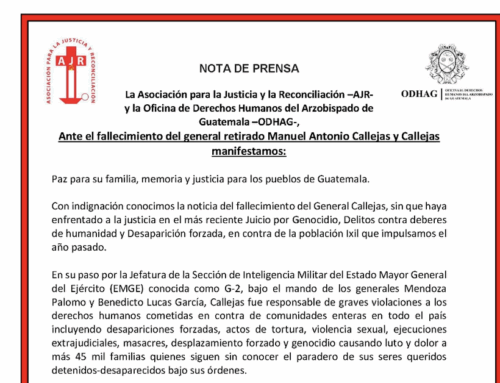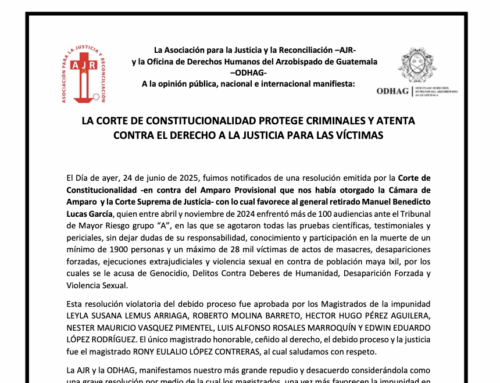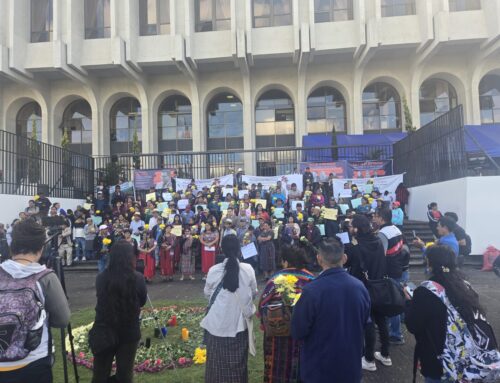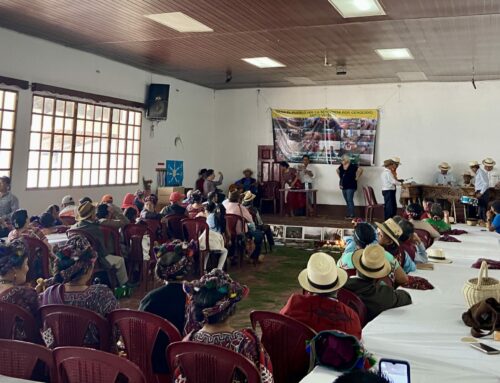| “The truth is told, justice was sentenced. Yes it was genocide.” See more photos from the May 24 march via CPR Urbana |
While public opinion on the genocide trial annulment has been expressed in the media and on the streets, the answers to the legal questions necessary to clarify the future of the trial are only slowly being untangled.
Following the decision of the Constitutional Court (CC) to annul trial proceedings after April 19, the Guatemalan Supreme Court faced the challenge of composing a three-judge Appelate Court to carry out the CC decision. Possibly fearing a black mark on their record and the condemnation of the multitudes of national and international bodies calling for an end to impunity in Guatemala, at least 61 judges excused themselves from the case.
Finally, on May 27 the Appellate Court was formed and rapidly carried out the CC decision to annul the trial. Shortly thereafter, Judge Yassmin Barrios excused all three members of her presiding tribunal from future genocide trial proceedings, the inevitable outcome of having already issued a verdict.
On June 4, the Appellate Court assigned the case to the First High Risk Crimes Court “B”, made up of Judges Irma Jeannette Valdés Rodas, María Eugenia Castellanos and Sara Griselda Yoc Yoc. The tribunal has presided over other high profile cases for justice including the conviction of Pujujiles gang members for the 2010 murder of Maya artist and community leader, Lisandro Leonardo Guarcax González, and 32 other victims. Judge Irma Jeannette Valdés Rodas also led the tribunal responsible for the conviction of ex-general Pedro Pimental for his involvement in the Dos Erres massacre.
While news reports quickly spread that the trial would not resume until April 2014, an official restart date for the genocide trial has not been determined. The First High Risk Crimes Court “B” has only confirmed their case list extends through March 2014.
Ríos Montt was transferred to the Military Hospital on May 13, after spending only 3 nights in prison. He stayed in the hospital until the early hours of June 12, when he was ordered to return home under house arrest, as he was ordered in January 2012. José Mauricio Rodríguez Sánchez, who was acquitted of all charges, is back in police custody and remains in the Military Hospital, according to Guatemalan newspaper El Periódico.
Meanwhile, Ríos Montt and Rodríguez Sánchez’ lawyers continue to argue that the former generals should be granted amnesty. However, Article 8 of the National Reconciliation Law, passed as part Guatemala’s 1996 Peace Accords, invalidates amnesty in the cases of genocide, torture and forced disappearance. Regardless, the defense lawyers continue to claim the law cannot be applied retroactively – that is to say that it cannot be applied to crimes committed in 1982 and 1983. The lawyers originally made the case for amnesty in December 2012, and were denied by Judge Miguel Ángel Gálvez. Naturally the defense appealed, and now it’s up to the Constitutional Court to make a final ruling. Ramón Cadena, expert in international law, declared in his testimony on day 15 of the genocide trial: “Genocide can’t be forgiven, it can’t be granted amnesty.”






Leave A Comment